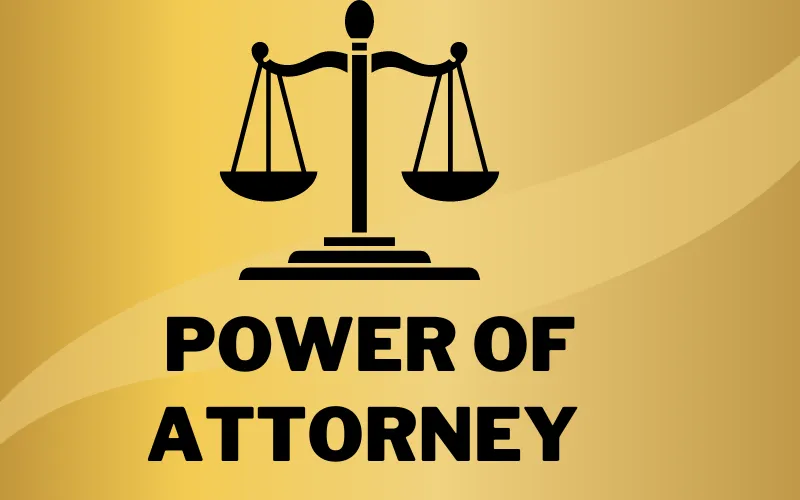A power of attorney is a legal document that enables you to choose another person to handle your affairs if you cannot do it for yourself. The person who makes the appointment designates the agent or attorney-in-fact. Your current situation’s characteristics will determine the type of power of attorney you select.

The fundamental idea has existed for ages. However, as the nation’s population has aged over the past few decades, power of attorney law has changed and grown significantly. Let me guide you about what are the 4 types of power of attorney.
What Is The Power Of Attorney Meaning?
A power of attorney is a legal document that appoints a specific person to act on behalf of another. Thus, a POA gives the agent or attorney-in-fact the authority to act on behalf of the principal. The principal’s property, finances, investments, and medical care may be subject to the agent’s decision-making, giving broad or limited discretion.
Power Of Attorney Responsibilities And Liabilities
The attorney must carry out all actions on behalf of the principal. Here are the rights and responsibilities of power of attorney:
Responsibilities
- However, if a power of attorney stipulates, the attorney may carry out all authorized operations but only in a specific manner.
- They are receiving money on the Principal’s behalf.
- The capability to open bank accounts, write checks, and sell property on the Principal’s behalf.
- If there is any doubt regarding the language of a power of attorney, it is advisable to consult a lawyer.
- Additionally, the attorney has to act in the principal’s best interests.
- An agent may act as the principal’s advocate and make choices on their behalf, such as paying the principal’s rent or mortgage, hiring maintenance personnel for the principal’s house, or hiring an attorney to act as the principal’s advocate.
- The terms require an agential care power of attorney to act responsibly about the wishes of their principal. Although the parties may hold divergent moral stances, the agent must act by the principal’s objectives.
- Through one or more powers of attorney, the principal can designate an agent to manage various tasks, including signing contracts, managing real and personal property, managing the principal’s financial and tax affairs, and making housing and healthcare arrangements.
- The person’s assets pay for their legal dependents’ support, upbringing, and care.
- Right to handle, negotiate, settle, and change any problems relating to real estate.
- The ability to rent property, collect rents, grant, bargain, sell, borrow, and mortgage.
- You have the right to sell every one of your stocks, bonds, and other investments.
- The attorney must sign all tax returns, insurance paperwork, and other documents before submitting.
- Right to enter into contracts and to perform any contract, agreement, writing, or item. Right to create, sign, deliver, and acknowledge any contract or agreement.
Liabilities
- An attorney must not violate the boundaries of the power of attorney. The attorney could hold accountable for any injury the donor or others sustain if they go beyond their authority.
- If the attorney violates any conditions, he will hold accountable to the donor unless he acted appropriately.
- The POA did not permit the distribution of inheritances or property transfer after the Principal’s passing.
- Real estate planning documents, including the principal’s will, may remain the same by the POA.
- The POA cannot change the nomination paperwork’s provisions with fraud or carelessness.
- The POA can only take actions in the Principal’s best interests.
- The POA can only be legitimately appointed if the Principal is physically and mentally healthy.
- The POA cannot treat the Principal’s property or funds as their own.
Different Types Of Power Of Attorney
If you don’t know what type of power of attorney covers everything. Let me outline the four different powers of attorney, each with a specific function:
General Power Of Attorney
In this circumstance, the agent can carry out nearly all actions on behalf of the principal, including creating bank accounts and handling personal money. When the principal loses capacity, revokes a power of attorney, or passes away, the general power of attorney agreement expires.
Durable Power of Attorney
This agreement names a representative to represent the principle. It has a lasting provision that keeps a power of attorney in effect even if the principal cannot act.
Limited or Special Power of Attorney
In this case, the agent confines to a certain area and has specific powers. One example is a power of attorney that allows the agent to sell a house or another piece of real estate.
Springing Durable Power of Attorney
A springing power of attorney is available in some states and takes effect when a certain circumstance, such as the principal’s incapacitation, happens.
To learn your loved one’s preferences for their financial stability and medical care should a time come when they cannot make the decisions for themselves, it is helpful to have these conversations while they are well and joyful.